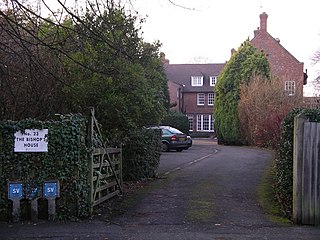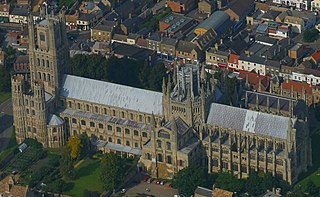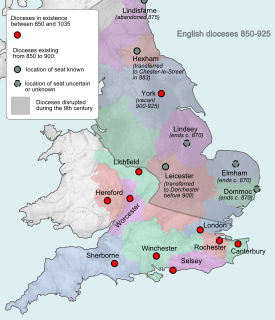Herfast or Arfast (died 1084) was the first Lord Chancellor of Norman England. He was also Bishop of Elmham and later Bishop of Thetford, after he moved his see there.

The Bishop of Coventry is the Ordinary of the England Diocese of Coventry in the Province of Canterbury. In the Middle Ages, the Bishop of Coventry was a title used by the bishops known today as the Bishop of Lichfield.
Nicholas of Ely was Lord Chancellor of England, Bishop of Worcester, Bishop of Winchester, and Lord High Treasurer in the 13th century.

The Bishop of Norwich is the ordinary of the Church of England Diocese of Norwich in the Province of Canterbury. The diocese covers most of the county of Norfolk and part of Suffolk. The current Bishop of Norwich is Graham James, who signs as +Graham Norvic.

Nicholas West, was an English bishop and diplomatist, born at Putney, and educated at Eton and at King's College, Cambridge, of which he became a fellow in 1486. He also had periods of study at Oxford and Bologna.
Æthelgar was Archbishop of Canterbury, and previously Bishop of Selsey.

The Bishop of Exeter is the Ordinary of the Church of England Diocese of Exeter in the Province of Canterbury. The current incumbent, since 30 April 2014, is Robert Atwell. The incumbent signs his name as his Christian name or forename followed by Exon., abbreviated from the Latin Episcopus Exoniensis.
The Bishop of Southwark is the ordinary of the Church of England Diocese of Southwark in the Province of Canterbury.

Hervey le Breton was a Breton cleric who became Bishop of Bangor in Wales and later Bishop of Ely in England. Appointed to Bangor by King William II of England, when the Normans were advancing into Wales, Hervey was unable to remain in his diocese when the Welsh began to drive the Normans back from their recent conquests. Hervey's behaviour towards the Welsh seems to have contributed to his expulsion from his see. Although the new king, Henry I wished to translate Hervey to the see of Lisieux in Normandy, it was unsuccessful.
Stephen Whitefield Sykes was a Church of England bishop and academic specialising in divinity. He was Van Mildert Professor of Divinity at Durham University from 1974 to 1985, and Regius Professor of Divinity at Cambridge University from 1985 to 1990. Between from 1990 and 1999, he served as the Bishop of Ely, the diocesan bishop of the Diocese of Ely. He was the Principal of St John's College, Durham from 1999 to 2006. He served as an Honorary Assistant Bishop in the Diocese of Durham during his time as head of St John's College and in retirement.
Thomas Brunce was a 15th-century Bishop of Rochester and then Bishop of Norwich.
Eadred was Bishop of Durham in around 1040. He had been the head of the cathedral chapter when Edmund the previous bishop died. Eadred is said to have taken money from the cathedral funds and purchased the office of bishop from the king. Symeon of Durham states that because of the sin of simony, Eadred died before he could be enthroned as bishop.

Walter Curle was an English bishop, a close supporter of William Laud. Born in Hatfield, Hertfordshire, he was educated at St Albans School and at Christ's College, Cambridge, transferring to Peterhouse, of which college he later was elected Fellow.
Roger Weseham was an English medieval Bishop of Coventry and Lichfield.
Wulfsige was a ninth-century Bishop of Sherborne.
Charles Edward Curzon was an Anglican bishop, the 6th Bishop of Stepney from 1928 until 1936 when he was appointed Bishop of Exeter.

John Nathaniel Quirk was an Anglican bishop.

Benjamin Lany, F.R.S., D.D. was an English academic and bishop.
Edmund Freke was an English dean and bishop.
Beornstan was an English Bishop of Winchester. He was consecrated in May 931. He died on 1 November 934. After his death, he was revered as a saint.








